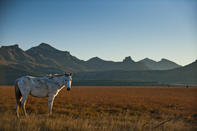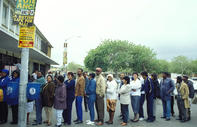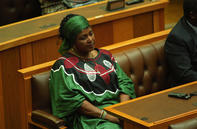The Promised Land
Conflict in the Cape colony between the British and the predominantly Dutch farmers (Boers) that had settled there to supply the Dutch East India Company with victuals caused many farmers to move away and seek new land to call their own.

Little was known about the interior regions of South Africa at the time. Large groups of farmers moved en masse to establish, what they perceived to be the promised land.
In 1835, the Voortrekkers, as they became known, began to move from the Cape Colonies in what became the great trek. The border between the Cape Colony and South Africa was the Orange River. Some of the Voortrekkers settled just north of the Orange River. Here they founded many towns and farms. In 1853, the Boers declared the area the Orange Free State.
This caused conflict to the Basotho people who already lived in this area. There were many battles between the two groups and in 1868, the Basotho leader, Moshoeshoe asked the British for protection. This ended the fighting and the Basotho Kingdom became a British protectorate. However, the British wanting to appease the Boers gave them most of the fertile lands to the Orange Free State and formed borders with the Basotho, which now is called Lesotho.
A True Democracy

During the Anglo-Boer War in 1899, the Orange Free State fought against the British. The Boers lost the war in 1902 and all the Boer Republics became British Colonies. Orange Free State then became the Orange River Colony. In 1910, it became a province of the South African Union and reverted its name back to the Orange Free State. In 1994, after South Africa became a true democracy the province's name was again changed this time to the Free State.
The ANC was founded in January 1912, when a group of people’s representatives and chiefs gathered at the Waaihoek Wesleyan Church, Bloemfontein. Initially the group called themselves the South African Native National Congress, (SANNC) which in 1923 became the African National Congress (ANC). A founding member of the SANNC was Thomas Mapikela, whose house was used as the headquarters for the SANNC, in a township of Bloemfontein.
Sasolburg, Bram Fischer and Winnie Mandela

Sasolburg originated in 1954 with the establishment of Sasol, the synthetic fuel producer.
Bram Fischer, the anti-apartheid lawyer who helped to defend Nelson Mandela and many other activists in the Treason Trial of 1956 - 1961 and the Rivonia Trial of 1963 - 1964 was born in Bloemfontein. He also died here whilst under house arrest in 1975.
The former wife of Nelson Mandela, Winnie Madikizela Mandela, spent over ten years under house arrest in Brandfort. Her house, which she shared with her daughter, Zindzi, was very small with no running water or electricity. During her house arrest, which ended in 1985, her house burnt down twice. It is now being renovated as a museum in Brandfort.